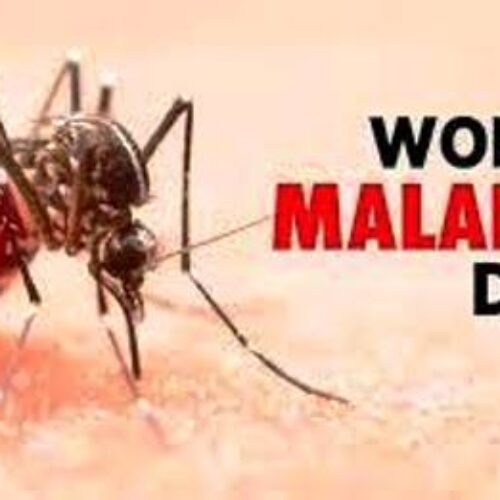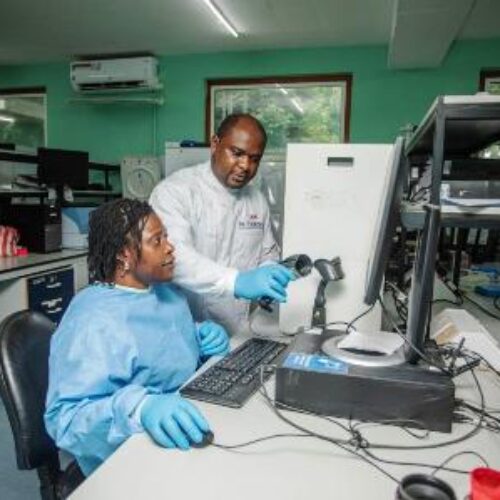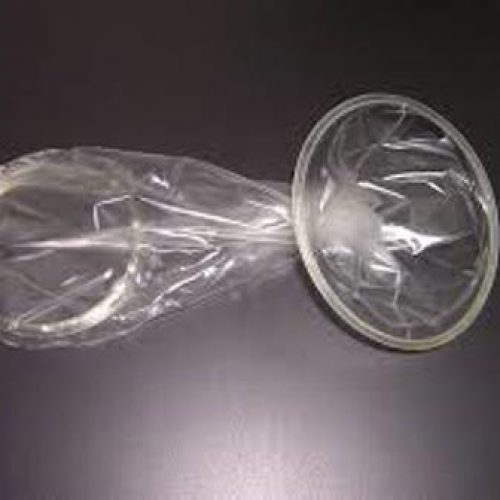Kidney disease or anger of the gods?
– Ufuoma’s ordeal with condition that swells her body
In the small Isoko community in Delta state where she hails from, it is a taboo to conduct the bedroom affair in the bush. You will be provoking the gods if you do.
But Ufuoma, 19, is ignorant of the belief when she fell in love. She had followed the young man to the farm and one thing led to another. They had sex. Unfortunately another villager from a nearby farm stumbled on them and raised the alarm. After a severe beating by his furious dad, Ufuoma was sent to live with her elder sister in the city. But her trouble had just begun.
Six months after she got to the city, her sister and neighbours noticed that she was adding weight almost on a daily basis. Soon they observed that her legs, arms and face had actually become swollen and seemed to be blowing up every passing moment. Her tummy was also beginning to protrude raising fear that she might be pregnant.
Ufuoma’s sister could bear it no longer and decided to take her back to the village. By this time Ufuoma noticed that her urine was foamy and she was always tired from even walking around the house. She ate very little as she seemed not to have appetite any more.
Her distrust father immediately took her to the local herbalist. Everyone who saw Ufuoma in the village believed the gods had swung into action. Her indiscretion in the bush had caught up with her. The herbalist recommended some sacrifices along with several concoctions she must regularly drink and bath with at least five times every day. She was also banned from eating solid foods and restricted of a diet of pap mixed with some black substance, for her breakfast, lunch and dinner.
Two weeks later, the condition got worse. Ufuoma could barely walk and life was gradually slipping away. Tired of the seeming ineffective concoctions and the sacrifices, she pleaded with a neighbor and commercial bike rider to take her to the only health centre in the village. The nurse in charge however sent for her father and explained the need to take her to the general hospital in the town nearby as her case could not be managed at the centre.
Doctors at the General Hospital described her case as Nephrotic Syndrome, a disease of the kidney caused by a wide range of factors which may include but not limited to:
- diabetes mellitus; a form of blood cancer known as multiple myeloma
- inability of the kidney to filter waste from the blood because the tissues are inflamed (glumerulonephritis)
- lupus erythematosus – an autoimmune disease which causes the individual immune system go so awry that it begins to attack its own tissues
- diseases affecting the small vessels of the kidney responsible for clearing or filtering wastes from the blood, known in medical parlance as the glumeruli.
- infections
- drug exposure
- malignancy, a disease that affects multiple systems in the body
- hereditary disorders
Experts say nephrotic syndrome is common both among children and adults. If left untreated, it may result in kidney failure and the individual may require dialysis or even kidney transplant to survive.
Ufuoma was lucky. After series of tests and investigations, the doctors concluded that her condition might have been caused by an infection. She was admitted in the hospital for two weeks and soon became her charming self again. Obviously, sex in the bush or anger of the gods had nothing to do with her swellings.
Why you must care for your kidneys
Your kidneys are very important organs in your body just like the heart and lungs. You need to ensure they function optimally for you to remain healthy.
According to the (American) National Kidney Foundation, an individual has two kidneys, each about the size of an adult fist, located on either side of the spine just below the rib cage. Although they are small, your kidneys perform many complex and vital functions that keep the rest of the body in balance. For example, kidneys:
- Help remove waste and excess fluid
- Filter the blood, keeping some compounds while removing others
- Control the production of red blood cells
- Make vitamins that control growth
- Release hormones that help regulate blood pressure
- Help regulate blood pressure, red blood cells, and the amount of certain nutrients in the body, such as calcium and potassium.
According to the experts, the kidney must be kept healthy all the time as there are several factors that could increase an individual’s risk of developing kidney damage or disease. Here are some tips on how to keep your kidneys healthy.
- Keep active and fit
 Regular exercise helps to lower the risk of chronic kidney disease. It can also reduce your blood pressure and boost your heart health, which are both important for preventing kidney damage. Mild exercise like walking, running, cycling and even dancing are great for your health. Find an activity that keeps you busy and have fun. It’ll be easier to stick to it and have great results.
Regular exercise helps to lower the risk of chronic kidney disease. It can also reduce your blood pressure and boost your heart health, which are both important for preventing kidney damage. Mild exercise like walking, running, cycling and even dancing are great for your health. Find an activity that keeps you busy and have fun. It’ll be easier to stick to it and have great results.
- Manage your blood sugar
 People with diabetes or a condition that causes high blood sugar, may develop kidney damage. When your body’s cells can’t use the glucose (sugar) in your blood, your kidneys are forced to work extra hard to filter your blood. Over years of exertion, this can lead to life threatening damage. However, if you can manage your blood sugar, you reduce the risk of damage. Also, if the damage is caught early, a doctor can take steps to reduce or prevent additional damage.
People with diabetes or a condition that causes high blood sugar, may develop kidney damage. When your body’s cells can’t use the glucose (sugar) in your blood, your kidneys are forced to work extra hard to filter your blood. Over years of exertion, this can lead to life threatening damage. However, if you can manage your blood sugar, you reduce the risk of damage. Also, if the damage is caught early, a doctor can take steps to reduce or prevent additional damage.
- Monitor blood pressure
 High blood pressure can cause kidney damage. If high blood pressure occurs with other health issues like diabetes, heart disease or high cholesterol, the impact on your body can be significant. A healthy blood pressure reading is 120/80. Pre-hypertension is between that point and 139/89. Lifestyle and dietary changes may help lower your blood pressure at this point.
High blood pressure can cause kidney damage. If high blood pressure occurs with other health issues like diabetes, heart disease or high cholesterol, the impact on your body can be significant. A healthy blood pressure reading is 120/80. Pre-hypertension is between that point and 139/89. Lifestyle and dietary changes may help lower your blood pressure at this point.
If your blood pressure readings are consistently above 140/90, you may have high blood pressure. You should talk with a doctor about monitoring your blood pressure regularly, making changes to your lifestyle, and possibly taking medication.
- Monitor weight and eat a balanced diet
People who are overweight or obese are at risk for a number of health conditions that can damage the kidneys. These include diabetes, heart disease, and kidney disease. A balanced diet that’s low in sodium, processed meats, and other kidney-damaging may help reduce the risk of kidney damage. Focus on eating fresh ingredients that are naturally low in sodium, such as cauliflower, blueberries, fish, whole grains, and more.
- Drink plenty of fluids
 There’s no magic behind the cliché advice to drink eight glasses of water a day, but it’s a good goal precisely because it encourages you to stay hydrated. Regular, consistent water intake is healthy for your kidneys.
There’s no magic behind the cliché advice to drink eight glasses of water a day, but it’s a good goal precisely because it encourages you to stay hydrated. Regular, consistent water intake is healthy for your kidneys.
Water helps clear sodium and toxins from your kidneys. It also lowers your risk of chronic kidney disease. Aim for at least 1.5 to 2 liters in a day. Exactly how much water you need depends largely on your health and lifestyle. Factors like climate, exercise, gender, overall health, and whether you’re pregnant or breastfeeding are important to consider when planning your daily water intake. People who have previously had kidney stones should drink a bit more water to help prevent stone deposits in the future.
- Don’t smoke
 Smoking damages your body’s blood vessels. This leads to slower blood flow throughout your body and to your kidneys.
Smoking damages your body’s blood vessels. This leads to slower blood flow throughout your body and to your kidneys.
Smoking also puts your kidneys at an increased risk for cancer. If you smoke and stop smoking, your risk will drop. However, it’ll take m,any years Trusted Source to return to the risk level of a person who’s never smoked.
- Be aware of the amount of OTC pills you take
 If you regularly take over-the-counter (OTC) pain medication, you may be causing kidney damage. Nonsteroidal anti-inflammatory drugs (NSAIDSs) including ibuprofen and naproxen can damage your kidneys if you take them regularly for chronic pain, headaches or arthritis.
If you regularly take over-the-counter (OTC) pain medication, you may be causing kidney damage. Nonsteroidal anti-inflammatory drugs (NSAIDSs) including ibuprofen and naproxen can damage your kidneys if you take them regularly for chronic pain, headaches or arthritis.
According to the National Kidney Foundation, these medications should not be taken for more than 10 days for pain, or more than three days for fever. Regularly taking more than eight aspirin tablets each day may reduce your kidney function temporarily or permanently.
People with no kidney issues who take the medicine occasionally are likely in the clear. However, if you use these medicines daily, you could be risking your kidneys’ health. Talk with a doctor about kidney-safe treatments if you’re coping with pain.
- Have your kidney function tested if you’re at high risk
If you’re at high risk of kidney damage or kidney disease, it’s a good idea to have regular kidney function tests. The following people may benefit from regular screening:
- people who are over 60 years old
- people who were born at a low birth weight
- people who have cardiovascular disease or have family members with it
- people who have or have a family history of high blood pressure
- people who have obesity
- people who believe they may have kidney damage
A regular kidney function test is a great way to know your kidney’s health and to check for possible changes. Getting ahead of any damage can help slow or prevent future damage.
– Culled from Better Health Channel
Know symptoms of kidney disease
Most people may not have any severe symptoms until their kidney disease is advanced. However, you may notice that you:
- feel more tired and have less energy
- have trouble concentrating
- have a poor appetite
- have trouble sleeping
- have muscle cramping at night
- have swollen feet and ankles
- have puffiness around your eyes, especially in the morning
- have dry, itchy skin
- need to urinate more often, especially at night
About author
You might also like
Pharma company recommends Free Malaria Management programme as part of fuel subsidy palliative
As Nigeria joins the rest of the world to mark the World Malaria Day today, a leading pharmaceutical company, St. Racheal’s Pharma, has called on the in-coming administration led by
AREF-ROCHE, GENENTECH launch Fellowship program for African scientists
Roche and the Africa Research Excellence Fund (AREF) have launched a new fellowship program to support the next generation of African scientists. The AREFRoche and Genentech Fellowship Program will support
Why female condom use remains low in Nigeria – Pathfinder International
Though female condom plays a key role in family planning, its use in Nigeria has remained very low due to culture, religion and other related barriers, Country Director, Pathfinder International,










0 Comments
No Comments Yet!
You can be first to comment this post!